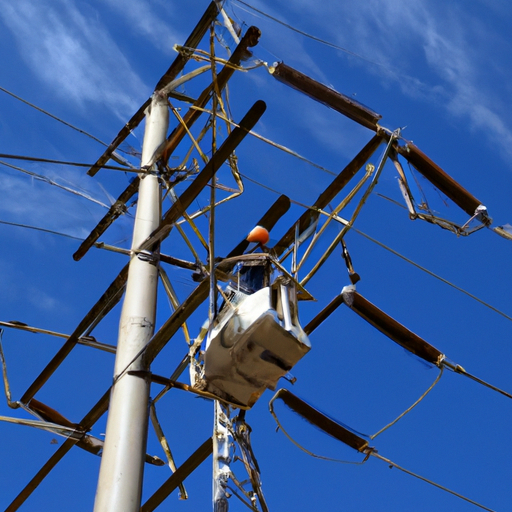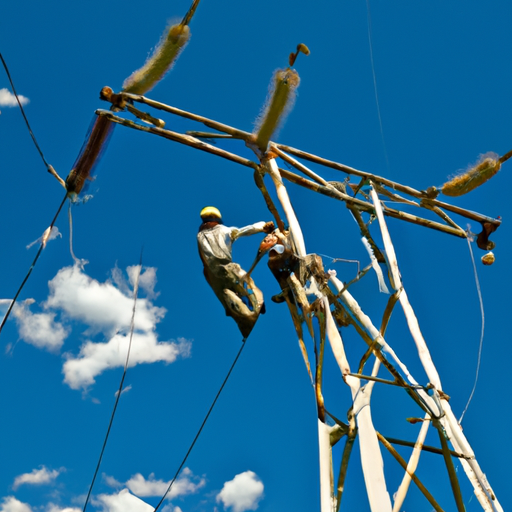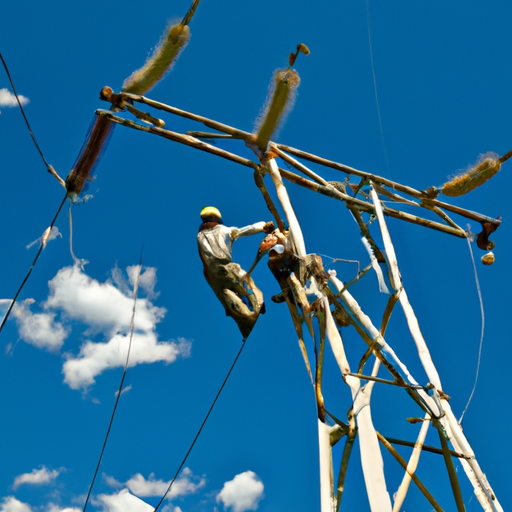Have you ever wondered about the difference between power linemen and telephone linemen? Well, in this content, you will learn all about it. Whether you’re curious about the job responsibilities, the skills required, or even the difference in work environments, you’ll gain a deeper understanding of these two professions.
So, let’s dive in and explore the distinction between power linemen and telephone linemen. By the end of this content, you will be able to appreciate the unique challenges and skills that each profession demands. Whether you’re considering a career in the field or simply curious about how these linemen keep our communities connected, you’re in for an enlightening read.

Understanding the Distinction between Power Linemen and Telephone Linemen
The field of utility work is a vital part of our modern infrastructure, ensuring the reliable functioning of our power and communication systems. Within this field, two key roles are power linemen and telephone linemen. While both occupations involve working with utility lines, there are distinct differences in their job functions, training, equipment, and work environments. In this article, we will explore these differences to gain a better understanding of the distinction between power linemen and telephone linemen.
Overview of Power Linemen
Roles and Responsibilities of Power Linemen
Power linemen are responsible for the maintenance, repair, and installation of electrical power lines. They work on high-voltage transmission and distribution systems, ensuring the consistent supply of electricity to homes, businesses, and industries. Power linemen are skilled in troubleshooting electrical faults, replacing damaged components, and performing regular inspections to identify potential issues.
Their responsibilities include climbing utility poles, working from bucket trucks, and using specialized equipment to handle conductors and transformers. Power linemen often work in teams to complete projects efficiently and safely.
Skills and Qualifications of Power Linemen
To become a power lineman, you need a combination of physical strength, technical knowledge, and professional training. Physical fitness is crucial as the job requires climbing poles, lifting heavy equipment, and withstanding adverse weather conditions. Additionally, power linemen must possess excellent troubleshooting skills and be able to make quick decisions in emergency situations.
Many power linemen complete vocational or trade school programs to learn the necessary technical skills. These programs provide instruction in electrical theory, safety protocols, and hands-on training with power line equipment. After completing their education, aspiring power linemen often undergo an apprenticeship program to gain practical experience under the guidance of experienced professionals.
Safety Precautions for Power Linemen
Safety is a top priority for power linemen due to the inherent risks associated with working on high-voltage systems. They must adhere to strict safety protocols, such as wearing protective clothing and equipment, using insulated tools, and following proper grounding practices. Regular safety meetings and ongoing training ensure that power linemen stay up to date with the latest safety procedures.
Overview of Telephone Linemen
Roles and Responsibilities of Telephone Linemen
Telephone linemen, also known as communication linemen, play a crucial role in ensuring reliable communication networks. They are responsible for the installation, maintenance, and repair of telephone and data transmission lines. Telephone linemen work on a variety of systems, including landlines, cellular networks, and internet infrastructure.
Their tasks include installing new lines, troubleshooting connection issues, and repairing damaged cables and equipment. Telephone linemen must be skilled in using specialized tools, such as cable splicers and line testers, to identify and resolve communication problems.
Skills and Qualifications of Telephone Linemen
Similar to power linemen, telephone linemen need a combination of technical knowledge and physical abilities to excel in their profession. They must understand the principles of telecommunications and be familiar with different types of cables, connectors, and network configurations. Strong problem-solving skills are essential for diagnosing and resolving communication issues efficiently.
Many telephone linemen acquire their skills through vocational or technical training programs in telecommunications. These programs cover topics such as network architecture, data transmission protocols, and equipment installation. Practical experience gained through apprenticeships or on-the-job training further enhances their skills and expertise.
Safety Precautions for Telephone Linemen
Working with communication lines also involves potential hazards, albeit of a different nature compared to power linemen. Telephone linemen must follow safety guidelines to protect themselves from falls, electrical shocks, and exposure to hazardous materials. They wear personal protective equipment, use climbing gear, and implement proper grounding practices to mitigate risks.
Differences in Job Functions
Equipment and Tools Used by Power Linemen
Power linemen work with high-voltage equipment and use specialized tools designed for working on electrical power lines. Some of the common tools include lineman’s pliers, cable cutters, and wire strippers. They also use safety equipment such as rubber gloves, sleeves, and helmets with face shields to protect against electrical hazards.
Power linemen often utilize bucket trucks, also known as aerial lifts, to access elevated areas safely. These trucks have extendable arms or ladders that provide a stable platform for performing tasks at various heights. Additionally, power linemen use handheld instruments for measuring voltage, current, and resistance to diagnose and troubleshoot electrical issues.
Equipment and Tools Used by Telephone Linemen
Telephone linemen work with communication cables and utilize tools specific to the telecommunications industry. Cable splicers, wire strippers, and crimping tools are commonly used to connect and repair communication cables. They also use specialized testing equipment, such as time domain reflectometers, to locate faults and monitor signal quality.
Telephone linemen often work from ladders or aerial lifts to access overhead lines. They may also work within confined spaces, such as underground utility vaults, to install or repair communication infrastructure. Safety equipment such as hard hats, safety glasses, and non-conductive footwear are essential for protecting against potential hazards.
Work Environment of Power Linemen
Power linemen typically work outdoors and are exposed to various weather conditions. They may have to work during storms, strong winds, or freezing temperatures to restore power quickly and efficiently. The work of power linemen is physically demanding, requiring them to climb poles, lift heavy equipment, and work at heights.
Power linemen are often called upon to respond to emergencies, such as power outages caused by storms or equipment failures. They must be prepared to work long hours, sometimes overnight, to restore power for their communities. In addition to their physical resilience, power linemen must possess the mental fortitude to handle high-pressure situations and make critical decisions.
Work Environment of Telephone Linemen
Telephone linemen work in a variety of environments, including urban areas, rural communities, and industrial settings. They often work both indoors and outdoors, depending on the task at hand. Telephone linemen may need to access rooftops, crawl through conduits, or work in underground utility tunnels to install or repair communication lines.
In addition to physical challenges, telephone linemen must also be adaptable to technological advancements in the telecommunications industry. They work with a wide range of equipment, including fiber optic cables, routers, and switches. Their work involves connecting, configuring, and troubleshooting complex communication systems.

Differences in Training and Education
Training Programs for Power Linemen
Power linemen training programs typically combine classroom instruction with hands-on experience. These programs are offered by vocational schools, community colleges, or trade organizations. Students learn about electrical theory, circuitry, safety protocols, and equipment operation. Practical training includes climbing utility poles, handling transformers, and working with live circuits.
After completing their education, aspiring power linemen often participate in apprenticeship programs. During these apprenticeships, they gain supervised on-the-job training, working alongside experienced professionals. This provides them with practical experience and opportunities to fine-tune their skills in a real-world setting.
Education Requirements for Power Linemen
While many power linemen acquire their skills through vocational programs, a high school diploma or equivalent is typically required for admission. Some employers may also have additional requirements, such as a minimum age or physical fitness standards. Aspiring power linemen must be prepared to meet these requirements and demonstrate their commitment to the profession.
Training Programs for Telephone Linemen
Training programs for telephone linemen focus on developing skills specific to the telecommunications industry. These programs cover topics such as network architecture, transmission protocols, and equipment installation. Students learn how to splice cables, troubleshoot network issues, and configure communication systems.
Many training programs for telephone linemen are offered by telecommunications companies, trade organizations, or community colleges. These programs may include both classroom instruction and hands-on training. Upon completion, graduates possess the necessary knowledge and skills to perform the duties of a telephone lineman.
Education Requirements for Telephone Linemen
Similar to power linemen, a high school diploma or equivalent is typically required for admission into training programs for telephone linemen. Basic knowledge of mathematics, physics, and computer science can be beneficial in understanding the technical aspects of telecommunications. As technology continues to evolve, telephone linemen must embrace ongoing learning to stay abreast of industry advancements.
Career Opportunities and Salary
Job Opportunities for Power Linemen
Power linemen are essential for maintaining the electrical power grid, and as such, there is a consistent demand for skilled professionals in this field. Job opportunities can be found with utility companies, electrical contractors, and government organizations. Power linemen also have the option to specialize in areas such as transmission, distribution, or substation maintenance, which can further enhance their career prospects.
Job Opportunities for Telephone Linemen
Telephone linemen are crucial for the proper functioning of communication networks, and their expertise is in demand in the telecommunications industry. Employment opportunities exist with telecommunication service providers, cable companies, and internet service providers. Additionally, telephone linemen may find job opportunities with government agencies and companies involved in infrastructure development.
Average Salary of Power Linemen
The average salary of a power lineman can vary depending on factors such as experience, location, and the specific job responsibilities. According to the U.S. Bureau of Labor Statistics, the median annual wage for electrical power-line installers and repairers was $76,860 in May 2020. However, power linemen who are part of a union or work for government organizations may have additional benefits and higher wages.
Average Salary of Telephone Linemen
Similarly, the average salary of a telephone lineman can also vary based on various factors. According to Salary.com, the median annual wage for telecommunications line installers and repairers was $67,170 as of May 2021. However, the salary range can be influenced by factors such as experience, geographic location, and the level of specialization within the telecommunications field.
Future Trends and Challenges
Technological Advancements for Power Linemen
Power linemen are experiencing a shift towards smart grid technologies and renewable energy sources. The integration of advanced sensors, automation systems, and data analytics is transforming the way power grids are operated and maintained. Power linemen must adapt to these advancements and acquire the necessary skills to work with smart grid technologies effectively.
Technological Advancements for Telephone Linemen
Telephone linemen are witnessing the rapid expansion of fiber optic networks and the evolution of 5G technology. These advancements require telephone linemen to possess the knowledge and skills to install and maintain complex communication systems. Keeping pace with emerging technologies is essential for telephone linemen to effectively meet the communication needs of businesses and consumers.
Challenges Faced by Power Linemen
Power linemen face various challenges in their line of work, including working in hazardous conditions, dealing with high levels of physical exertion, and responding to emergencies in a timely manner. Additionally, the aging infrastructure and increasing demands on the electrical grid present ongoing challenges. Power linemen must be prepared to overcome these obstacles to ensure the reliable supply of electricity.
Challenges Faced by Telephone Linemen
Telephone linemen also encounter challenges in their profession. The rapid growth of digital networks, increased connectivity demands, and the need to maintain 24/7 communication services pose significant challenges. Staying current with evolving technologies, managing network congestion, and troubleshooting complex network issues require continuous learning and adaptability.
Importance of Collaboration
Collaboration between Power Linemen and Telephone Linemen
Power linemen and telephone linemen often work together on joint projects and maintenance activities. Communication systems rely on the availability of uninterrupted power, and power distribution systems require effective communication for coordinating repairs and maintenance. Collaboration between power linemen and telephone linemen is crucial for the seamless operation of both power and communication infrastructure.
Joint Projects and Responsibilities
Collaborative efforts between power linemen and telephone linemen can involve joint projects such as the installation of power lines and communication cables along the same utility poles. They may also collaborate during emergency response situations, ensuring that power restoration and communication services are prioritized and coordinated efficiently.
Benefits of Collaborative Efforts
Collaboration between power linemen and telephone linemen brings several benefits. It enables better coordination and communication during project planning and execution. Information sharing between the two groups enhances efficiency and problem-solving capabilities. By working together, power linemen and telephone linemen promote a safer work environment and contribute to the overall reliability of utility services.
Safety and Regulations
Safety Regulations for Power Linemen
Safety regulations are of paramount importance for power linemen due to the risks associated with high-voltage systems. Power linemen must comply with safety standards established by regulatory agencies, such as the Occupational Safety and Health Administration (OSHA). These regulations cover areas such as personal protective equipment, work procedures, and equipment maintenance.
Safety Regulations for Telephone Linemen
Telephone linemen also adhere to safety regulations set forth by OSHA and industry standards. While the hazards they encounter may be different from power linemen, precautions related to working at heights, handling hazardous materials, and preventing falls are still critical. Regular safety training and maintaining up-to-date knowledge of safety regulations are crucial for telephone linemen.
Government Oversight and Compliance
Both power linemen and telephone linemen work under the purview of government agencies responsible for regulating their respective industries. These agencies set safety guidelines, licensing requirements, and ensure compliance with industry standards. Regular inspections, audits, and certifications help maintain standards and ensure the safety and reliability of utility services.
Conclusion
Understanding the distinction between power linemen and telephone linemen is important for appreciating the complexities of the utility industry. While both play critical roles in maintaining our power and communication networks, their job functions, training, equipment, and work environments differ. Power linemen focus on maintaining electrical power systems, whereas telephone linemen specialize in communication infrastructure. Collaborative efforts between the two professions, along with adherence to safety regulations, are vital for the efficient and safe functioning of our utility systems. By recognizing the unique contributions and challenges of power linemen and telephone linemen, we can better appreciate the indispensable work they do to keep our modern society connected.




